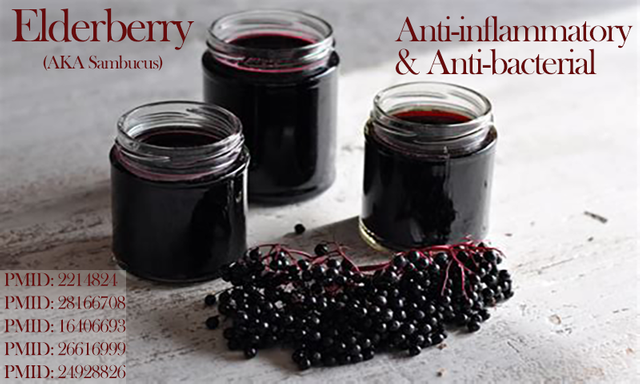Elderberry (Sambucus) exhibits anti-inflammatory effects and anti-bacterial activity against Salmonella.
.png)
Studies validate claims about the anti-inflammatory and anti-bacterial effects of Elderberry.
A study titled, Potential anti-inflammatory, antioxidant and antimicrobial activities of Sambucus australis., found that, "Solely the leaf extract showed significant inhibition of NO and TNF-α production in RAW264.7 cells at concentrations of 2 and 100 μg/mL, respectively, and suppression of TNF-α inhibition of NF-κB by 12.8 and 20.4% at concentrations of 50 and 100 μg/mL, respectively. The extract also exhibited antibacterial activity against Salmonella typhimurium (MIC 250 μg/mL) and Klebsiella pneumoniae (MIC 250 μg/mL)", and concluded that "the ethanol leaf extract of S. australis exhibit prominent anti-inflammatory effects".
A study titled, "Antiinflammatory activity of Sambucus ebulus hexane extracts", concluded that "the highest activity was showed in the aerial parts and roots that at 600 mg/kg i.p. inhibited inflammation by ca. 80% (78% for diclofenac at 100 mg /kg i.p.). No extracts exhibit toxicity when injected up to 2 g/ kg intraperitoneally in mice."
A study titled, "Gastrointestinal digested Sambucus nigra L. fruit extract protects in vitro cultured human colon cells against oxidative stress", found that "despite the significant loss of EDB (elderberry) bioactive compounds due to the digestion process, the colon-digested extract was able to reduce the excessive intracellular ROS production (22%) and oxidative DNA damage (46%) in the colon cells at a dose of 1 mg of freeze-dried EDB powder/ml. Moreover, the colon-digested EDB extract inhibited oxidant-induced mutagenicity (26%) in the Salmonella typhimurium TA102 strain, as determined by the Ames test.
A study titled, "Plants used in Guatemala for the treatment of gastrointestinal disorders. 1. Screening of 84 plants against enterobacteria", screened 84 of the most commonly used plants in Guatemala for healing against five enterobacteria that are pathogenic to man and found that "The plants of American origin which exhibited the best antibacterial activity were: Byrsonima crassifolia, Diphysa robinioides, Gnaphalium stramineum, Guazuma ulmifolia, Psidium guajava, Sambucus mexicana, Simarouba glauca, Smilax lundelii, Spondias purpurea and Tagetes lucida." The study concluded that the results "indicate a scientific basis for use of these medicinal plants for attacking enterobacterial infections in man".
This post got an extra 5 power for following us
Follow @elsurtidor to get biggest votes in your next posts